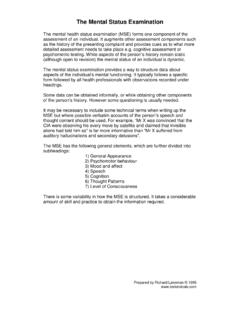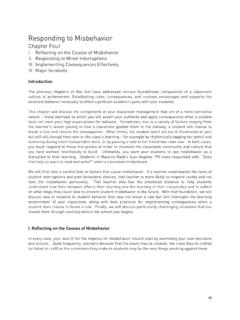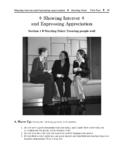Transcription of Responding therapeutically to disturbing beliefs
1 Responding therapeutically to disturbing beliefs One of the most perplexing interpersonal situations a mental health professional will encounter is how to respond to another's expression of bizarre or frankly delusional ideas. The adage Don't argue but don't reinforce fixed false beliefs leaves one decidedly short on solutions. Using tricks such as diversion, switching topics or worst of all, ignoring the expression runs the risk of invalidating the person's experience and leaving them feeling misunderstood or unheard. Whilst, these tricks may not reinforce the delusion they may reinforce a sense of alienation.
2 This brief paper provides some principles on how to respond in a therapeutic manner to someone who expresses bizarre or delusional ideas. The nature of delusions Many people experience delusions that are not necessarily problematic the child that wants to believe in Santa Claus, or the person that buys a lottery ticket every week, convinced that they will win. In particular states of vulnerability, most people are prone to jumping quickly to conclusions. For example, when home alone one is more likely to experience the tapping of a branch on a window, or a shadow as an intruder. It appears that people are not altogether rational in their thinking, weighing up the evidence that support the inferences they make about what's going on the world.
3 If people were like that, they would not only be extremely dull, but they would also be exceedingly slow. For jumping to conclusions' and being reasonably certain about things without all the evidence is something we have to do everyday. All of us interpret situations according to our beliefs , are more likely to notice evidence that confirms our beliefs and discount evidence to the contrary. A delusion then, may be thought of as a difference in degree, not kind, of thinking that we all engage in. Research and anecdotal evidence suggests that the conviction with which people may hold delusional ideas tends to wax and wane.
4 It is not uncommon for people to report that when they are unwell' or vulnerable they develop beliefs that when feeling well or resilient they regard as odd or patently wrong. Nevertheless, they may experience the same beliefs when they become unwell again. Some people's delusions may have a grandiose flavour and it is not hard to conceptualise the ideas as compensating for some inadequacy in a person's life. Nihilistic delusions may be symbolic of a sense of estrangement or alienation from others. Delusions may serve a protective purpose and it is principally for this reason that they should not be tackled head on, but neither should they or the person be ignored.
5 There is some wisdom in the adage not to attempt to argue a delusion away. By definition, delusions are tenaciously held despite presentation of contrary evidence. How certain are we of anything? How might you respond if someone told you, you are not who you believe yourself to be? Most people are likely to defend their belief about who they are and this is also true for delusions. What is certain is that what the person believes will have emotional and behavioural consequences. Just as the child who believes in Santa Claus may feel excitement, the person who misinterprets a shadow as an intruder may feel anxious.
6 The person with bizarre delusional beliefs will experience feelings associated with their beliefs . Whatever, one's feelings about whether the person's beliefs are grounded in reality, or one's framework for understanding delusions, the person's emotional responses are unequivocally real, worthy of exploration and working through. The following model is based on the assumptions described above and should not be adhered to in a slavish fashion . By Richard Lakeman 2003 Responding therapeutically to disturbing beliefs An empathy model . Person says I have worms eating my brain . Acknowledge what the person has said One does not need to reinforce the person's beliefs .
7 Use phrases such as You You say you have worms eating your brain Acknowledge your understanding Use phrases such as I can't see or I was told I can't see that and the etc, rather than stating that what the person tests don't show any believes is untrue worms in your Try and imagine how the other person might feel ..I don't know what it is Take cues from the person's affect. Try and imagine all like to think that worms the possible scenarios. Do not just go for the obvious. are eating my brain but I. Check out your intuitions imagine it would feel Be tentative rather than certain. Use phases such as I very imagine that I might if I thought.
8 Is that how it is can you tell me what it for you? If you get it wrong be genuinely interested in feels like? how things are for the person and ask further open- ended questions Explore the feelings and methods of coping It is more than Use phrases such as When you have in the my head what has helped . Sometimes just acknowledging the is throbbing . feelings is but if the feelings are distressing talking about coping, or what the person can do to cope Have you had this with the feelings can be help. feeling before?.. What worked then?.. By Richard Lakeman 2003 Responding therapeutically to disturbing beliefs USEFUL INSIGHTS FOR CBT WITH SCHIZOPHRENIA.
9 Source: Nelson, (1997). Cognitive behavioural therapy with schizophrenia: a practice manual. Cheltenham, : Stanley Thornes, p. 82. Believing something to be true does not necessarily mean that it is true. Because something seems obviously and evidently true does not necessarily mean that it is true. Just because I intuitively feel' something to be true does not necessarily mean that it is true, however certain I may feel about it. Believing something to be true that is not actually true is very common indeed, so it is not a weird or peculiar thing to do. We all hold some beliefs that do not accurately reflect reality.
10 We are not aware of their inaccuracy when we believe them. Holding inaccurate beliefs does not matter unless it causes us a problem. It is OK/good to realise I was wrong about a particular belief and to change it accordingly. We can imagine things that are impossible in the real world. Because I can imagine something happening does not mean that it will happen - nor does imagining it happening in any way increase the likelihood of it happening. My brain is capable of misinterpreting things and giving me the wrong information. Our brains are capable of producing very strange experiences; these experiences may be completely convincing at the time but be completely wrong or even impossible in the real' world.









